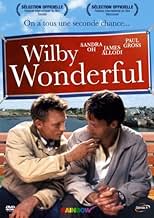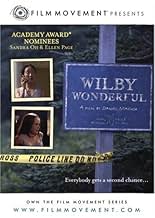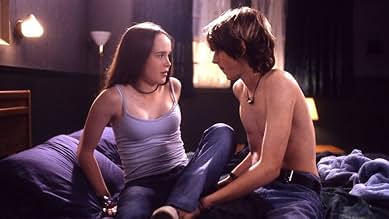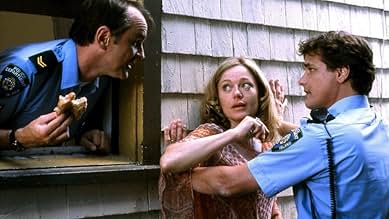VALUTAZIONE IMDb
6,6/10
1651
LA TUA VALUTAZIONE
Aggiungi una trama nella tua linguaA day-in-the-life dark comedy concerning a group of islanders, their respective secrets, and one man's plan to kill himself quietly.A day-in-the-life dark comedy concerning a group of islanders, their respective secrets, and one man's plan to kill himself quietly.A day-in-the-life dark comedy concerning a group of islanders, their respective secrets, and one man's plan to kill himself quietly.
- Premi
- 2 vittorie e 6 candidature totali
Elliot Page
- Emily Anderson
- (as Ellen Page)
Recensioni in evidenza
I saw this film at the 2004 Toronto International Film Festival.
Wilby Wonderful is the latest film from director, writer, playwright, and actor Daniel MacIvor. Set in a small island town, the film follows a cast of characters (played by a veritable who's who of Canadian cinema) over the course of a single day.
There is the woman who grew up in Wilby, moved away, and returned with her teenaged daughter to reopen a cafe (Rebecca Jenkins and Ellen Page, who previously worked together on the MacIvor-penned Marion Bridge). There is one of the town's police officers (Paul Gross), and his businesswoman wife (Sandra Oh), who find themselves in a marriage that has drifted apart. There is the town mayor, played by Maury Chaykin, and a dyslexic painter, played by Callum Keith Rennie. And finally, there is a video store owner (James Allodi), who spends much of the movie making ineffectual attempts to commit suicide. Lurking under it all is a scandal that will affect them all.
The film takes a look at the connections between the people in a small town, their hopes and dreams (both realized and not), and their prejudices. It shows people trying to both discover new, and recapture lost, feelings. As Paul Gross' character puts it while standing on the shore, looking at the mainland: seeing where you came from lets you remember what you wanted for the future.
I really enjoyed this movie, my one Canadian pick for the festival this year. The cast acquits themselves well, and despite the relatively large number of characters, I didn't feel like I was distracted by too many story lines, or that any one character received more attention than the others. And despite the limited timeframe of the movie, a single day, the story did not feel rushed or hurried. I thought the resolutions found or not found by the characters followed from what was seen and felt on screen, and didn't come out of the blue.
Daniel MacIvor, along with pretty much the entire cast, attended the screening. MacIvor gave quite an entertaining introduction before the film and stayed afterwards for a Q&A session:
Wilby Wonderful is the latest film from director, writer, playwright, and actor Daniel MacIvor. Set in a small island town, the film follows a cast of characters (played by a veritable who's who of Canadian cinema) over the course of a single day.
There is the woman who grew up in Wilby, moved away, and returned with her teenaged daughter to reopen a cafe (Rebecca Jenkins and Ellen Page, who previously worked together on the MacIvor-penned Marion Bridge). There is one of the town's police officers (Paul Gross), and his businesswoman wife (Sandra Oh), who find themselves in a marriage that has drifted apart. There is the town mayor, played by Maury Chaykin, and a dyslexic painter, played by Callum Keith Rennie. And finally, there is a video store owner (James Allodi), who spends much of the movie making ineffectual attempts to commit suicide. Lurking under it all is a scandal that will affect them all.
The film takes a look at the connections between the people in a small town, their hopes and dreams (both realized and not), and their prejudices. It shows people trying to both discover new, and recapture lost, feelings. As Paul Gross' character puts it while standing on the shore, looking at the mainland: seeing where you came from lets you remember what you wanted for the future.
I really enjoyed this movie, my one Canadian pick for the festival this year. The cast acquits themselves well, and despite the relatively large number of characters, I didn't feel like I was distracted by too many story lines, or that any one character received more attention than the others. And despite the limited timeframe of the movie, a single day, the story did not feel rushed or hurried. I thought the resolutions found or not found by the characters followed from what was seen and felt on screen, and didn't come out of the blue.
Daniel MacIvor, along with pretty much the entire cast, attended the screening. MacIvor gave quite an entertaining introduction before the film and stayed afterwards for a Q&A session:
- MacIvor calls the film a "Canadian commercial film", and wanted it to be familiar, but with a twist to wake everyone up.
- The story took about three years to make it to the screen, starting from around New Year's Eve 2001 at a party of Canadian director Jeremy Podeswa.
- MacIvor wanted to write a "guy with a heart story" rather than his usual fare.
- The movie was originally to be called Honey, but then the Jessica Alba movie of the same name came out, which necessitated a change. This lead to the current title, which affected part of the story.
- MacIvor said the theater (and the movie) contained pretty much every famous Canadian actor, assuming Don McKellar and Sarah Polley were in the room (not sure about Polley, but I did see McKellar talking with the cast outside the theatre prior to the showing). He found it weirdly easy to get the cast he wanted, helped by being able to tell people that he wrote specific parts for them.
- MacIvor was asked if writing for a wide range of characters was harder than writing for a few. His response was that he wanted to learn how, and figured there was no better way than to try. He was worried that the audience might attach themselves to a specific storyline and spend much of the movie waiting to get back to their favoured plot, but those fears were dispelled by the excellent acting of the cast.
- Because the film is set during the course of a single day, editing and continuity is harder.
- MacIvor was asked if he is now favouring films over plays or vice-versa. He said he isn't favouring either, and is currently working on both a new play and a new screenplay. Asked about the difference between the two , he said that what he doesn't like about films (vs. writing plays) is that once a film is complete, he can't change it.
- When starting to write, things for the stage tend to start out post-modern; but for a movie, it is usually an idea about watching somebody.
- About the differences between film and theatre, he likes to use the quote, "it's not apples and oranges or cats and dogs, it's apples and dogs", they're completely different. He likes to think from the theatre background he's able to bring a collaborative, inclusive feeling to the set. Art in theatre is live in front of the audience, whereas in film it is light projected on a flat surface and the art has happened previously.
- As a writer, he finds that sometimes for film he writes too much.
- Asked about writing specifically Canadian stories, he said that while he has made a commitment to stay in Canada and more specifically, in Nova Scotia, he likes to keep stories open so that people do not focus on watching a story about a specific group (islanders, easterners, Canadians, etc).
A day in the life on Wilby Island, off Nova Scotia, may not sound like a resource for rich storytelling, but in the gifted hands of writer/director Daniel MacIvor and inordinately talented Canadian cast WILBY WONDERFUL penetrates more dark secrets, exposes more astray lives, and addresses more human frailties than almost all of the competition. This is independent film-making at its finest, with all of the emphasis on quality and little concern for the big budget special effects that mire so many films today.
On the little island, divided between islanders and mainlanders 'visiting', lives an array of lonely people. We are introduced to a 'cause celebre' that happened on the beach (though the facts are hazy) and investigating the scandal are police officers Buddy French (Paul Gross) and his somewhat loose cannon Stan (portrayed by MacIvor himself). Buddy's wife Carol (Sandra Oh) is a very busy real estate person, assisted by her doofus secretary Deena (Kathryn MacLellan), out to sell a home to the town mayor (Maury Chaykin) and family (Susannah Hoffman and Marcella Grimaux), and while Carol is fretting over details, her meandering husband Buddy is secreting an affair with island returnee wannabe café owner Sandra Anderson (Rebecca Jenkins), whose libidinous past negatively influences her young daughter Emily (Ellen Page) in her new physical tryst with young Taylor (Caleb Langille). And while each of these stories unfolds, the town gossip Irene (Mary Ellen MacLean) keeps her evil eye on the soon-to-be-made apparent scandal that video store owner Dan Jarvis (James Allodi), who spends the entire movie attempting variations on suicide, and town painter Duck MacDonald (Callum Keith Rennie) are to be outed as being gay. It is the strange interplay of each of these lonely, needy characters that brings brilliant focus to the tiny bit of reality that is actually heartfelt.
MacIvor and friends pull off this strange little black comedy with ease and aplomb and the film is a charmer in every way - from script to cinematography (Rudolf Blahacek) to musical score (Michael Timmins). This is a splendid little movie that deserves a very wide audience. Grady Harp
On the little island, divided between islanders and mainlanders 'visiting', lives an array of lonely people. We are introduced to a 'cause celebre' that happened on the beach (though the facts are hazy) and investigating the scandal are police officers Buddy French (Paul Gross) and his somewhat loose cannon Stan (portrayed by MacIvor himself). Buddy's wife Carol (Sandra Oh) is a very busy real estate person, assisted by her doofus secretary Deena (Kathryn MacLellan), out to sell a home to the town mayor (Maury Chaykin) and family (Susannah Hoffman and Marcella Grimaux), and while Carol is fretting over details, her meandering husband Buddy is secreting an affair with island returnee wannabe café owner Sandra Anderson (Rebecca Jenkins), whose libidinous past negatively influences her young daughter Emily (Ellen Page) in her new physical tryst with young Taylor (Caleb Langille). And while each of these stories unfolds, the town gossip Irene (Mary Ellen MacLean) keeps her evil eye on the soon-to-be-made apparent scandal that video store owner Dan Jarvis (James Allodi), who spends the entire movie attempting variations on suicide, and town painter Duck MacDonald (Callum Keith Rennie) are to be outed as being gay. It is the strange interplay of each of these lonely, needy characters that brings brilliant focus to the tiny bit of reality that is actually heartfelt.
MacIvor and friends pull off this strange little black comedy with ease and aplomb and the film is a charmer in every way - from script to cinematography (Rudolf Blahacek) to musical score (Michael Timmins). This is a splendid little movie that deserves a very wide audience. Grady Harp
What an enjoyable movie. Saw it at the Stony Brook Film Festival and was disappointed to hear it has gone straight to video. With so much crap out there, there is surely a place for a movie like this. Unfortunately, there are no special effects, or in your face sex and violence. The story makes sense, the loose ends are tied up and the characters are real. In fact, one of the few known faces, to me, was Sandra Oh and she was nearly a distraction, because she is so familiar. Everyone else seemed more real. This movie was made by the same guy who made "Marion Bridge" another Canadian movie set in Cape Breton and starring, if that's the right word, the delightful Molly Parker. Bravo John McIvor and everyone involved in this thoroughly entertaining movie. You'd have been pleased at the ovation at the end of the screening.
This movie was on a local cable channel, and I was very pleasantly surprised by it. It's called a comedy, but I see it more as a "slice of life" movie. Not really a drama, not really a comedy, but a wonderful movie that really hooked me into the characters. The story was great (and way too many movies have cruddy scripts and story lines). I, too, found that no one character got the main focus of the story and yet I wasn't hoping to find out more from everyone. What I got was just enough. The people were real, smart, and the interactions were very true to life. The only thing I would do is make the movie a bit longer (just because I liked everyone's story so much) If you get a chance to see this movie, see it. It's well worth the time.
This web-of-life drama with a dark comedic edge takes place in a small town on the fictional island of Wilby, somewhere off the coast of Nova Scotia. Here we get to know quite a few people, beginning with Dan Jarvis (James Allodi), a video store owner whose wife has just left him. His exquisite despair, agitation and dead serious suicidal impulses are occasioned not only by this loss but, more fundamentally, by the fact that he is being exposed, against his wishes, as a gay man, not a social status often sought in this tight little conservative village.
Jarvis's forced "outing" is part of a more sweeping attack on regular gatherings of homosexuals and drug users at a waterfront park. Turns out that developers are behind the exposes. They're almost drooling in anticipation of establishing a destination golf club with surrounding upscale houses on the now public park land, once they succeed in convincing the townsfolk that the only sure way to keep unsavory characters from corrupting their young people and way of life is to get rid of that park, i.e., by selling it to them, and for a song at that.
We also meet Buddy French (Paul Gross), a straight arrow local cop, and his tightly wound wife Carol (Sandra Oh), who has gotten herself into a chronic dither chasing brass rings in the world of real estate sales. Then there is Sandy Anderson (Rebecca Jenkins), the faded sex queen and mother of teenage daughter Emily (Ellen Page), whom Sandy worries will follow in her own pathetic footsteps.
Rounding out the group of major players in this drama are Wilby's Mayor, Brent Fisher (Maury Chaykin), whose porcine joviality seems overdone, perhaps to cover less seemly activities, and the pivotal character Duck MacDonald (Callum Keith Rennie), an Everyman clad perpetually in overalls, whose gentle manner and near omnipresence suggest that he's a sort of guardian angel placed among these humans to bail them out of trouble. In smaller roles, there's also Irene (Mary Ellen MacLean), a first rate gossip, and Buddy's police partner, Stan (played by the film's writer-director, Daniel McIvor), whose conduct is sometimes nefarious.
I take the trouble to mention all of these people because the film is really more a series of character sketches than a narrative, and because the acting is, with perhaps one exception, uniformly fine. For some viewers, the exception may be Sandra Oh's over-the-top frenzied behavior during much of the film, though certainly there are ambitious control freaks out there in the real world who carry on like she does. (Incidentally, the beauty of Ms. Oh's face is captured stunningly here by DP Rudolf Blahacek, especially in profile in a scene shot while she is driving.)
Some viewers might also wonder whether James Allodi's compulsive suicidal behavior as the deeply suffering Dan Jarvis is also over the top. He keeps making good faith efforts to end his life that are thwarted, sometimes in ways that make you laugh even when your intentions are otherwise. In this darkly funny depiction, MacIvor seems to have borrowed from the drollery of Bud Cort's habitual suicidal poses in "Harold and Maude."
We viewers can also easily see the pain in Jarvis's face and wonder how so many of the town citizens can fail to notice or respond to him. Fact is that in real life this is common. Often people are either too self absorbed or otherwise preoccupied to see pain in others. Or if they do, they gloss over it because they are too busy or are reluctant to intrude, to mind another person's business.
The film offers a wonderful quote from Mark Twain, delivered by Buddy French to Mayor Fisher: "Golf: A good walk ruined." "Wilby" was produced not by Canada's National Film Board, the source of so many wonderful movies from that country, but jointly by the provincial film boards of Nova Scotia and Ontario. The location for the film is actually not an island at all, but rather the town of Shelburne, pop. 2,000, on the southwest coast of the Nova Scotian mainland.) "Wilby" is unlikely to get wide U. S. distribution, and that is unfortunate, because it's a little gem of a movie. My rating: 8/10 (B+). (Seen on 11/28/05). If you'd like to read more of my reviews, send me a message for directions to my websites.
Jarvis's forced "outing" is part of a more sweeping attack on regular gatherings of homosexuals and drug users at a waterfront park. Turns out that developers are behind the exposes. They're almost drooling in anticipation of establishing a destination golf club with surrounding upscale houses on the now public park land, once they succeed in convincing the townsfolk that the only sure way to keep unsavory characters from corrupting their young people and way of life is to get rid of that park, i.e., by selling it to them, and for a song at that.
We also meet Buddy French (Paul Gross), a straight arrow local cop, and his tightly wound wife Carol (Sandra Oh), who has gotten herself into a chronic dither chasing brass rings in the world of real estate sales. Then there is Sandy Anderson (Rebecca Jenkins), the faded sex queen and mother of teenage daughter Emily (Ellen Page), whom Sandy worries will follow in her own pathetic footsteps.
Rounding out the group of major players in this drama are Wilby's Mayor, Brent Fisher (Maury Chaykin), whose porcine joviality seems overdone, perhaps to cover less seemly activities, and the pivotal character Duck MacDonald (Callum Keith Rennie), an Everyman clad perpetually in overalls, whose gentle manner and near omnipresence suggest that he's a sort of guardian angel placed among these humans to bail them out of trouble. In smaller roles, there's also Irene (Mary Ellen MacLean), a first rate gossip, and Buddy's police partner, Stan (played by the film's writer-director, Daniel McIvor), whose conduct is sometimes nefarious.
I take the trouble to mention all of these people because the film is really more a series of character sketches than a narrative, and because the acting is, with perhaps one exception, uniformly fine. For some viewers, the exception may be Sandra Oh's over-the-top frenzied behavior during much of the film, though certainly there are ambitious control freaks out there in the real world who carry on like she does. (Incidentally, the beauty of Ms. Oh's face is captured stunningly here by DP Rudolf Blahacek, especially in profile in a scene shot while she is driving.)
Some viewers might also wonder whether James Allodi's compulsive suicidal behavior as the deeply suffering Dan Jarvis is also over the top. He keeps making good faith efforts to end his life that are thwarted, sometimes in ways that make you laugh even when your intentions are otherwise. In this darkly funny depiction, MacIvor seems to have borrowed from the drollery of Bud Cort's habitual suicidal poses in "Harold and Maude."
We viewers can also easily see the pain in Jarvis's face and wonder how so many of the town citizens can fail to notice or respond to him. Fact is that in real life this is common. Often people are either too self absorbed or otherwise preoccupied to see pain in others. Or if they do, they gloss over it because they are too busy or are reluctant to intrude, to mind another person's business.
The film offers a wonderful quote from Mark Twain, delivered by Buddy French to Mayor Fisher: "Golf: A good walk ruined." "Wilby" was produced not by Canada's National Film Board, the source of so many wonderful movies from that country, but jointly by the provincial film boards of Nova Scotia and Ontario. The location for the film is actually not an island at all, but rather the town of Shelburne, pop. 2,000, on the southwest coast of the Nova Scotian mainland.) "Wilby" is unlikely to get wide U. S. distribution, and that is unfortunate, because it's a little gem of a movie. My rating: 8/10 (B+). (Seen on 11/28/05). If you'd like to read more of my reviews, send me a message for directions to my websites.
Lo sapevi?
- QuizPaul Gross' two children Hannah and Jack Gross appear in the background of the movie.
- Citazioni
Buddy French: I like Mark Twain. You know what else he said? "Faith is believing something you know isn't true."
- Curiosità sui creditiMovie title is rolled out on a festival banner on a bridge.
- Colonne sonoreGive Me The Chance To Fall
Performed by Reg Vermue (as Gentleman Reg)
Written by Reg Vermue
Courtesy of Three Gut Records
I più visti
Accedi per valutare e creare un elenco di titoli salvati per ottenere consigli personalizzati
- How long is Wilby Wonderful?Powered by Alexa
Dettagli
Botteghino
- Budget
- 2.500.000 CA$ (previsto)
- Lordo in tutto il mondo
- 1749 USD
- Tempo di esecuzione
- 1h 39min(99 min)
- Colore
- Mix di suoni
- Proporzioni
- 1.85 : 1
Contribuisci a questa pagina
Suggerisci una modifica o aggiungi i contenuti mancanti






























